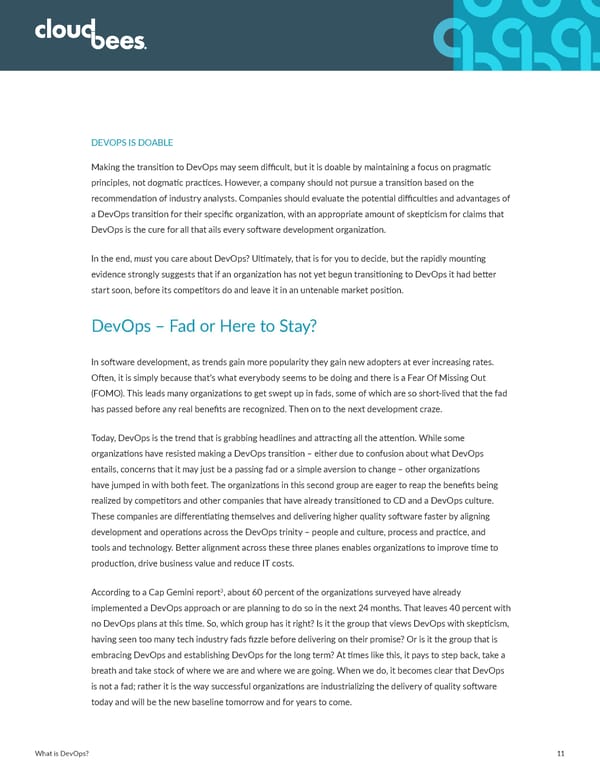DEVOPS IS DOABLE Making the transition to DevOps may seem difficult, but it is doable by maintaining a focus on pragmatic principles, not dogmatic practices. However, a company should not pursue a transition based on the recommendation of industry analysts. Companies should evaluate the potential difficulties and advantages of a DevOps transition for their specific organization, with an appropriate amount of skepticism for claims that DevOps is the cure for all that ails every software development organization. In the end, must you care about DevOps? Ultimately, that is for you to decide, but the rapidly mounting evidence strongly suggests that if an organization has not yet begun transitioning to DevOps it had better start soon, before its competitors do and leave it in an untenable market position. DevOps – Fad or Here to Stay? In software development, as trends gain more popularity they gain new adopters at ever increasing rates. Often, it is simply because that’s what everybody seems to be doing and there is a Fear Of Missing Out (FOMO). This leads many organizations to get swept up in fads, some of which are so short-lived that the fad has passed before any real benefits are recognized. Then on to the next development craze. Today, DevOps is the trend that is grabbing headlines and attracting all the attention. While some organizations have resisted making a DevOps transition – either due to confusion about what DevOps entails, concerns that it may just be a passing fad or a simple aversion to change – other organizations have jumped in with both feet. The organizations in this second group are eager to reap the benefits being realized by competitors and other companies that have already transitioned to CD and a DevOps culture. These companies are differentiating themselves and delivering higher quality software faster by aligning development and operations across the DevOps trinity – people and culture, process and practice, and tools and technology. Better alignment across these three planes enables organizations to improve time to production, drive business value and reduce IT costs. According to a Cap Gemini report3, about 60 percent of the organizations surveyed have already implemented a DevOps approach or are planning to do so in the next 24 months. That leaves 40 percent with no DevOps plans at this time. So, which group has it right? Is it the group that views DevOps with skepticism, having seen too many tech industry fads fizzle before delivering on their promise? Or is it the group that is embracing DevOps and establishing DevOps for the long term? At times like this, it pays to step back, take a breath and take stock of where we are and where we are going. When we do, it becomes clear that DevOps is not a fad; rather it is the way successful organizations are industrializing the delivery of quality software today and will be the new baseline tomorrow and for years to come. What is DevOps? 11
 What is DevOps ? Page 11 Page 13
What is DevOps ? Page 11 Page 13